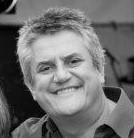
Q1. Why did you take part in Future Professional Directors and what was your role at the time?
My role was and is an assistant director in academic services in the Open University. I had been looking around for a development programme and came across the Future Professional Directors online and found it interesting.
Q2. Before you took part in the programme, what were you looking to gain?
Having had conversations with my line manager regarding The Open University’s institutional context we identified that it would be useful for me to get leadership and change management development and strategic/ cross-boundary leadership that would help me lead my large team through the unprecedented change.
Q3. What were your impressions of the programme?
I loved the programme, I thought it was brilliant. I’d already attended the Preparing for Senior Strategic Leadership course so it was interesting to compare the two. The key difference between the courses was that Preparing for Senior Strategic Leadership was focused on all aspiring senior university leaders, whereas Future Professional Directors was more tailored to individuals working in professional services.
Q4. What was the most useful thing you learned and why?
One of the great things about the course was that there was a real engagement of the participants in development. There were the expected lectures, background reading and group work but there were extra things as well – project work, the 360 tools/profiling and the action learning sets. The absolute highlight was working with an actor on the last day of the course. I found FPD multi-faceted and multi-dimensional, with great feedback and input on what it means to be a leader. For me, it was also about what it means to be a person and what it means to be a human being with leadership responsibilities in an organisational context.
Q5. As a result of the programme, what are you doing differently?
Throughout the programme I came up with a number of ideas that I’ve utilised in my day to day job. For example feedback to my direct reports and some of the developmental actions I’ve been doing with my direct reports have been taken from the content of the course.
Q6. What do you think is the most important skill needed to be a Professional Director?
On the course Doug Parkin said, "leadership is about being yourself with skill". I feel that the most important skill is to be your authentic self and that takes a lifetime’s work, but the space and time on the course provided me with the opportunity to develop that skill.
Future Professional Directors is a unique programme for colleagues in professional services from all areas of the institution. Developed in partnership with nine sector bodies, it builds the confidence and skills needed to lead successfully within and across professional services and the wider institution.
This intensive programme includes three modules, two action learning sets, and online learning.